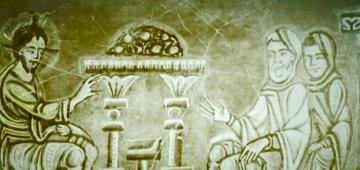 |
The Parable of Three LoavesThis parable is found only in the Gospel of Luke. As narrated by the Evangelist, Christ tells the parable of three loaves right after teaching His disciples the Lord’s Prayer. It is a reminder of the result of a steadfast, persevering prayer… Father Markos Mangasaryan provides explanations.
|
|
|
The Parable of the Good SamaritanThis parable has a number of different interpretations in the Armenian bibliography, yet they all derive from the explanation of St. Augustine.
|
|
|
The Parable of Unforgiving ServantIn the parable, a king decides to take account of his servants. However, one of the servants begs him to forgive and the king takes compassion, forgives his debts and releases him. When the servant leaves the place, he finds one of his fellowservants owing him and doesn’t act likewise. The king finds out about it and punishes him. What was the reason for the servant to be considered as unfaithful – explains Father Markos Mangasaryan.
|
|
|
The Parables of the Mustard Seed and the LeavenIn the parables of the mustard seed and the leaven, Christ compared the Kingdom of Heaven to a mustard seed or leaven. The mustard seed, which is the smallest of all fruits, grew to be huge, and the leaven being a very small piece of dough, made the entire heap of flour to leaven. What does the Lord teach us through these parables? Father Markos Mangasaryan provides explanations. |
|
|
The Parable of SowerMany consider the parable of sower to be one of the best parables of the Gospel. This is the first parable, which Christ tells and interprets at the same time. Whaat does the Lord teach through this parable about the word of God and the hearts of men? Father Markos Mangasaryan provides interpretation. |
|
|
The Parable of WeedsWeeds bear resemblance to wheat, however, they are harmful plants. For a while, the roots of wheat and weeds grow together and intermingle, and if the weed is outrooted, the mature wheat may also be harmed. In the Gospel Parable on weeds, God allows both plants grow together. The key question of the parable is valid up today – why does God allow the wicked and the harmful to exist on the earth? Father Markos Mangasaryan provides explanation. |
